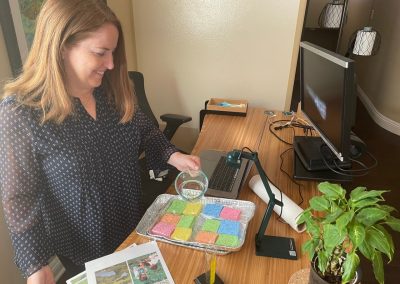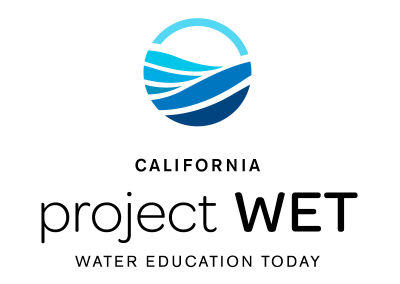Water has been making headlines lately. From water shut offs in Texas to the lack of rainfall in California, reminders of the importance of fresh water are all around us. For the RCD, water education has always been an integral part of our outdoor education curriculum, and Project WET (Watershed Education Today) has helped us take our education programming to a new level!
Project WET is a non-profit organization that provides educators of all kinds with hands-on, water-based science lessons that support NGSS (Next Generation Science Standards), common core state standards and other national educational standards. The Project WET Curriculum and Activity Guide is filled with hundreds of lessons, providing countless ways to engage students in science education and offering hands-on lessons that can be adapted and connected to multiple disciplines.
The RCD has been partnering with Project WET for years, successfully incorporating their lessons into both our outdoor and indoor education programs, and even now into our virtual curriculum. Our Education Coordinator and Education & Communications Specialist are both certified Project WET facilitators and can now officially lead trainings. Recently the RCD has held multiple Project WET educator trainings which we call Project WET: Watersheds to the Sea. During these trainings, formal and informal educators learn how to effectively incorporate Project WET lessons into their curriculum, no matter what their classroom looks like.
After the training, educators are eligible to receive a Project WET Activity Guide as well as access to its online portal. As a bonus, educators that take the training are also offered free virtual lessons led by RCD Educators, which can be tailored to various curriculums and grade levels. Whether your classroom is inside, outside or digital, our facilitators will find lessons that work for you and meet your specific student needs.
The goal of Project WET is to help students and adults alike understand global challenges when it comes to water while inspiring local solutions. Through these lessons we hope to create a world filled with environmental stewards that understand and value the world’s natural resources and in turn will help shape a more sustainable future.
A recent LA Times article suggested we will need a “Mega-miracle” to make up for the lack of rain over the past few months. While we may not be able to deliver a miracle, we will continue to work hard to educate the next stewards of our land and water. If you are a teacher and are interested in receiving this water-based curriculum, reach out to our Education Coordinator.


